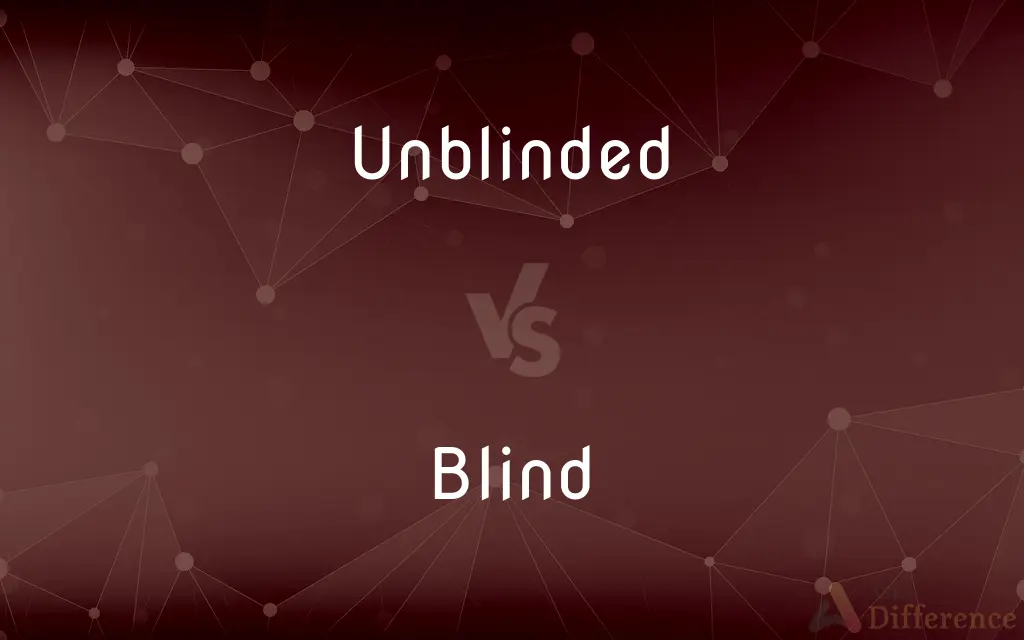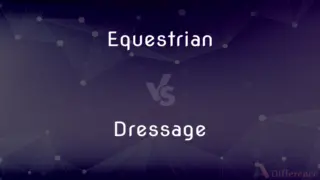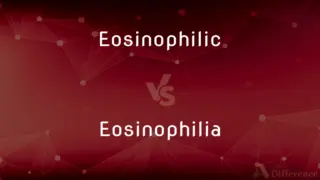Unblinded vs. Blind — What's the Difference?
By Tayyaba Rehman & Maham Liaqat — Updated on March 30, 2024
Unblinded studies reveal the treatment to participants and researchers, enhancing bias risk; blind studies conceal it to maintain objectivity.

Difference Between Unblinded and Blind
Table of Contents
ADVERTISEMENT
Key Differences
In unblinded studies, both the participants and the researchers are aware of which treatment or intervention participants receive. On the other hand, blind studies, particularly single-blind studies, are designed so that participants are not aware of which treatment they receive, whether it is the experimental treatment or a placebo.
In double-blind studies, a subtype of blind studies, neither the participants nor the researchers conducting the study know who receives the actual treatment and who receives the placebo. This method is considered the gold standard in clinical research because it minimizes biases that could affect the results of the study. By keeping both parties blind to the assignment, the study can more accurately measure the treatment's effectiveness without the influence of preconceptions.
The choice between conducting an unblinded or blind study often depends on the nature of the treatment and the research goals. Unblinded studies can be useful for initial exploratory research or in cases where blinding is impossible, but they require careful interpretation to account for potential biases. Blind studies, especially double-blind ones, are preferred for their ability to provide more objective and reliable results, making them crucial in the development and approval of new medical treatments.
While unblinded studies may offer practical advantages in certain research contexts, the risk of bias they introduce necessitates rigorous data analysis and often further validation through blind studies. The transparency and openness in unblinded studies can sometimes foster a different level of participant engagement and feedback, which can be valuable in specific research phases.
Blind studies, by design, protect against the placebo effect and observer bias, leading to results that more accurately reflect the treatment's efficacy. The blinding process requires careful planning and execution, including the use of identical-looking treatments and placebos, to ensure that the blinding is maintained throughout the study.
ADVERTISEMENT
Comparison Chart
Awareness of Treatment
Participants and researchers know the treatment details.
Treatment details are concealed from participants and/or researchers.
Risk of Bias
Higher due to knowledge of treatment.
Lower, as knowledge of treatment is controlled.
Method Complexity
Simpler, as no need to disguise treatments.
More complex, requiring placebo control and sometimes identical-looking treatments.
Ideal Use
Situations where blinding is not feasible or for exploratory research.
When objectivity is critical, especially in clinical trials.
Bias Mitigation
Requires careful interpretation and validation.
Built-in through the study design to minimize bias.
Compare with Definitions
Unblinded
Often easier to conduct.
The unblinded study required no placebo, simplifying its execution.
Blind
A study design that conceals treatment information from participants.
In the blind study, participants were unaware if they received the placebo or the drug.
Unblinded
A study where all parties know the treatment details.
In the unblinded trial, patients knew they were receiving the new medication.
Blind
Minimizes participant bias.
Blinding ensured the psychological effect did not skew the study's findings.
Unblinded
Can introduce bias due to awareness.
The unblinded nature of the study could influence participants' reported outcomes.
Blind
Can be single or double-blind.
The double-blind study prevented both doctors and patients from knowing the treatment assignments.
Unblinded
Requires careful data analysis.
Researchers had to account for potential biases in the unblinded study results.
Blind
Yields more objective results.
Blind studies like this have contributed to unbiased evaluations of new treatments.
Unblinded
Useful in specific research contexts.
For the surgical technique comparison, an unblinded approach was necessary.
Blind
Requires more planning.
Creating a convincing placebo was crucial for maintaining the study's blind status.
Unblinded
Simple past tense and past participle of unblind
Blind
Unable to see because of injury, disease, or a congenital condition
Guide dogs for the blind
He was blind in one eye
A blind man with a stick
Unblinded
Not having been blinded.
Blind
Lacking perception, awareness, or judgement
She was blind to the realities of her position
A blind acceptance of the status quo
Blind
(of a corner or bend in a road) impossible to see round
Two trucks collided on a blind curve in the road
Blind
Not the slightest (used in emphatic expressions)
This declaration is not a blind bit of good to the workers
Blind
(of a plant) without buds, eyes, or terminal flowers
Planting too shallowly is the most common cause of bulbs coming up blind
Blind
Cause (someone) to be unable to see, permanently or temporarily
Her eyes were blinded with scalding tears
The injury temporarily blinded him
Blind
Deprive (someone) of understanding, judgement, or perception
He was blinded by his faith
Somehow Clare and I were blinded to the truth
Blind
Move very fast and dangerously
I could see the bombs blinding along above the roof tops
Blind
A screen for a window, especially one on a roller or made of slats
She pulled down the blinds
Blind
Something designed to conceal one's real intentions
He phoned again from his own home: that was just a blind for his wife
Blind
A heavy drinking bout
He's off on a blind again
Blind
Without being able to see clearly
He was the first pilot in history to fly blind
Wines were tasted blind
Blind
Unable to see with the eyes; sightless.
Blind
Having a maximal visual acuity of the better eye, after correction by refractive lenses, of one-tenth normal vision or less (20/200 or less on the Snellen test).
Blind
Of, relating to, or for sightless persons.
Blind
Performed or made without the benefit of background information that might prejudice the outcome or result
Blind taste tests used in marketing studies.
Blind
Performed without preparation, experience, or knowledge
A blind stab at answering the question.
Blind
Performed by instruments and without the use of sight
Blind navigation.
Blind
Unable or unwilling to perceive or understand
Blind to a lover's faults.
Blind
Not based on reason or evidence; unquestioning
Put blind faith in their leaders.
Blind
(Slang) Drunk.
Blind
Lacking reason or purpose
Blind fate.
Blind choice.
Blind
Incompletely or illegibly addressed
Blind mail.
Blind
Hidden from sight
A blind seam.
Blind
Screened from the view of oncoming motorists
A blind driveway.
Blind
Secret or otherwise undisclosed
A blind item in a military budget.
Blind
Closed at one end
A blind socket.
A blind passage.
Blind
Having no opening
A blind wall.
Blind
Immoderate or unrestrained
Blind rage.
Blind
(Botany) Failing to produce flowers or fruits
A blind bud.
Blind
(used with a pl. verb) Blind people considered as a group. Used with the
A radio station for reading to the blind.
Blind
Often blinds Something, such as a window shade or a Venetian blind, that hinders vision or shuts out light.
Blind
A shelter for concealing hunters, photographers, or observers of wildlife.
Blind
Something intended to conceal the true nature, especially of an activity; a subterfuge.
Blind
A forced bet in poker that is placed before the cards are dealt.
Blind
Without seeing; blindly.
Blind
Without the aid of visual reference
Flew blind through the fog.
Blind
Without forethought or provision; unawares
Entered into the scheme blind.
Blind
Without significant information, especially that might affect an outcome or result
“When you read blind, you see everything but the author” (Margaret Atwood).
Blind
(Informal) Into a stupor
Drank themselves blind.
Blind
Used as an intensive
Thieves in the bazaar robbed us blind.
Blind
To deprive of sight
Was blinded in an industrial accident.
Blind
To dazzle
Skiers temporarily blinded by sunlight on snow.
Blind
To deprive of perception or insight
Prejudice that blinded them to the proposal's merits.
Blind
To withhold light from
Thick shrubs blinded our downstairs windows.
Blind
(not comparable) Unable to see, due to physiological or neurological factors.
Even a blind hen sometimes finds a grain of corn.
Braille is a writing system for the blind.
His blind eye
Blind
(comparable) Failing to see, acknowledge, perceive.
The lovers were blind to each other's faults.
Authors are blind to their own defects.
Blind
(not comparable) Of a place, having little or no visibility.
A blind path
A blind ditch
A blind corner
Blind
(not comparable) Having no openings for light or passage; both dark and exitless.
A blind wall
A blind alley
Blind
Smallest or slightest.
I shouted, but he didn't take a blind bit of notice.
We pulled and pulled, but it didn't make a blind bit of difference.
Blind
(not comparable) Without any prior knowledge.
He took a blind guess at which fork in the road would take him to the airport.
I went into the meeting totally blind, so I really didn't have a clue what I was talking about.
Blind
(not comparable) Unconditional; without regard to evidence, logic, reality, accidental mistakes, extenuating circumstances, etc.
Blind deference
Blind justice
Blind punishment
Blind
(science) Using blinded study design, wherein information is purposely limited to prevent bias.
A blind trial
Blind
Unintelligible or illegible.
A blind passage in a book; blind writing
Blind
(horticulture) Abortive; failing to produce flowers or fruit.
Blind buds
Blind flowers
Blind
Uncircumcised
Blind
A movable covering for a window to keep out light, made of cloth or of narrow slats that can block light or allow it to pass.
Blind
A destination sign mounted on a public transport vehicle displaying the route destination, number, name and/or via points, etc.
Blind
Any device intended to conceal or hide.
A duck blind
Blind
Something to mislead the eye or the understanding, or to conceal some covert deed or design; a subterfuge.
Blind
(military) A blindage.
Blind
A hiding place.
Blind
The blindside.
Blind
No score.
Blind
(poker) A forced bet: the small blind or the big blind.
The blinds are $10 and $20, and the ante is $1.
Blind
(poker) A player who is forced to pay such a bet.
The blinds immediately folded when I reraised.
Blind
(transitive) To make temporarily or permanently blind.
The light was so bright that for a moment he was blinded.
Don't wave that pencil in my face - do you want to blind me?
Blind
To curse.
Blind
To darken; to obscure to the eye or understanding; to conceal.
Blind
To cover with a thin coating of sand and fine gravel, for example a road newly paved, in order that the joints between the stones may be filled.
Blind
Without seeing; unseeingly.
Blind
(colloquial) Absolutely, totally.
To swear blind
Blind
Without looking at the cards dealt.
Blind
As a pastry case only, without any filling.
Blind bake your pie case for fifteen minutes, then add the filling. This will help avoid a "soggy bottom".
Blind
Destitute of the sense of seeing, either by natural defect or by deprivation; without sight.
He that is strucken blind can not forgetThe precious treasure of his eyesight lost.
Blind
Not having the faculty of discernment; destitute of intellectual light; unable or unwilling to understand or judge; as, authors are blind to their own defects.
But hard be hardened, blind be blinded more,That they may stumble on, and deeper fall.
Blind
Undiscerning; undiscriminating; inconsiderate.
This plan is recommended neither to blind approbation nor to blind reprobation.
Blind
Having such a state or condition as a thing would have to a person who is blind; not well marked or easily discernible; hidden; unseen; concealed; as, a blind path; a blind ditch.
Blind
Involved; intricate; not easily followed or traced.
The blind mazes of this tangled wood.
Blind
Having no openings for light or passage; as, a blind wall; open only at one end; as, a blind alley; a blind gut.
Blind
Unintelligible, or not easily intelligible; as, a blind passage in a book; illegible; as, blind writing.
Blind
Abortive; failing to produce flowers or fruit; as, blind buds; blind flowers.
Blind
To make blind; to deprive of sight or discernment.
A blind guide is certainly a great mischief; but a guide that blinds those whom he should lead is . . . a much greater.
Blind
To deprive partially of vision; to make vision difficult for and painful to; to dazzle.
Her beauty all the rest did blind.
Blind
To darken; to obscure to the eye or understanding; to conceal; to deceive.
Such darkness blinds the sky.
The state of the controversy between us he endeavored, with all his art, to blind and confound.
Blind
To cover with a thin coating of sand and fine gravel; as a road newly paved, in order that the joints between the stones may be filled.
Blind
Something to hinder sight or keep out light; a screen; a cover; esp. a hinged screen or shutter for a window; a blinder for a horse.
Blind
Something to mislead the eye or the understanding, or to conceal some covert deed or design; a subterfuge.
Blind
A blindage. See Blindage.
Blind
A halting place.
Blind
See Blende.
Blind
People who have severe visual impairments;
He spent hours reading to the blind
Blind
A hiding place sometimes used by hunters (especially duck hunters);
He waited impatiently in the blind
Blind
Something that keeps things out or hinders sight;
They had just moved in and had not put up blinds yet
Blind
Something intended to misrepresent the true nature of an activity;
He wasn't sick--it was just a subterfuge
The holding company was just a blind
Blind
Render unable to see
Blind
Make blind by putting the eyes out;
The criminals were punished and blinded
Blind
Make dim by comparison or conceal
Blind
Unable to see
Blind
Unable or unwilling to perceive or understand;
Blind to a lover's faults
Blind to the consequences of their actions
Blind
Not based on reason or evidence;
Blind hatred
Blind faith
Unreasoning panic
Common Curiosities
What is a double-blind study?
A study where neither participants nor researchers know who receives the real treatment versus a placebo, minimizing bias.
Can unblinded studies be reliable?
They can offer valuable insights, especially in specific contexts, but their findings generally require validation due to the higher risk of bias.
How do researchers decide between blind and unblinded studies?
The decision is based on the treatment's nature, the study's objectives, and the need for bias minimization.
Do blind studies eliminate all forms of bias?
While they significantly reduce bias, no study design can eliminate all potential biases.
What is the main advantage of unblinded studies?
Unblinded studies can be simpler and more direct, useful where blinding is not feasible.
What is the placebo effect?
The phenomenon where participants experience real changes due to their expectations of treatment, rather than the treatment itself.
How does a blind study reduce bias?
By concealing treatment details, it prevents participants' and researchers' expectations from influencing the results.
Can the results of blind studies be more trusted?
Generally, yes, because the design minimizes bias, making the findings more reliable.
Why might a researcher choose an unblinded study?
Practicality, ethical considerations, or when the treatment's nature makes blinding impossible.
Why are blind studies preferred in clinical trials?
They provide more reliable, objective data by minimizing the placebo effect and observer bias.
Are unblinded studies faster to conduct?
They can be, as they avoid the complexities of creating and managing placebo controls.
What ethical considerations come into play with blind studies?
Ensuring informed consent and balancing the need for scientific rigor with participants' rights and well-being.
How do blind studies impact the development of medical treatments?
They are crucial for objectively assessing treatment efficacy, leading to safer and more effective medical interventions.
What challenges do blind studies face?
Ensuring effective blinding and managing the complexity of placebo control are significant challenges.
How is participant expectation managed in unblinded studies?
Through careful analysis and by comparing results with other studies, including blind ones.
Share Your Discovery

Previous Comparison
Equestrian vs. Dressage
Next Comparison
Eosinophilic vs. EosinophiliaAuthor Spotlight
Written by
Tayyaba RehmanTayyaba Rehman is a distinguished writer, currently serving as a primary contributor to askdifference.com. As a researcher in semantics and etymology, Tayyaba's passion for the complexity of languages and their distinctions has found a perfect home on the platform. Tayyaba delves into the intricacies of language, distinguishing between commonly confused words and phrases, thereby providing clarity for readers worldwide.
Co-written by
Maham Liaqat















































